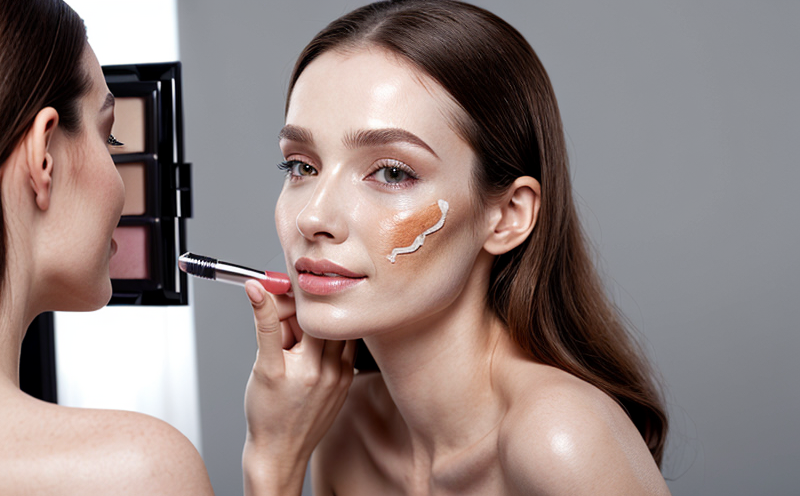Dermatological Testing of Compact Powder Cosmetics
The dermatological testing of compact powder cosmetics is a critical step in ensuring product safety and efficacy. This service involves comprehensive evaluation to assess the potential risks associated with prolonged skin contact, ensuring that the cosmetic formulations are suitable for use by consumers. The process encompasses various tests designed to evaluate irritation, sensitization, comedogenicity (ability to clog pores), and other dermatological parameters.
The primary objective of this testing is to identify any adverse reactions or effects on the skin caused by prolonged exposure to compact powder cosmetics. This includes evaluating the product's compatibility with different skin types such as sensitive, dry, oily, and combinations. The tests are conducted in accordance with international standards such as ISO 10993-1, ISO 20782, and ASTM F854.
The testing process begins with thorough ingredient analysis to identify potential allergens or irritants. This is followed by the preparation of test specimens using actual compact powder samples. The tests are performed under controlled conditions that mimic real-world usage scenarios to ensure accurate results. The laboratory uses advanced instrumentation and techniques such as patch testing, in vitro assays, and clinical observations.
Following the completion of the tests, detailed reports are generated providing insights into the product's safety profile. These reports include information on the potential risks associated with prolonged skin contact, any identified allergens or irritants, and recommendations for improving the formulation if necessary. The results of these tests are crucial for cosmetic manufacturers to ensure compliance with regulatory requirements and to protect consumer health.
The dermatological testing process is a multi-step procedure that ensures the safety and efficacy of compact powder cosmetics. It involves several key steps including ingredient analysis, specimen preparation, in vitro and in vivo testing, and final reporting. The use of advanced instrumentation and techniques ensures accurate and reliable results.
For quality managers and compliance officers, this service provides critical insights into product safety and potential risks. R&D engineers can leverage the findings to improve product formulations, ensuring they meet regulatory requirements and consumer expectations. Procurement teams benefit from this testing by gaining confidence in the quality of raw materials used in compact powder cosmetics.
Industry Applications
Dermatological testing of compact powder cosmetics is widely applicable across various sectors, including beauty and personal care industries. This service ensures that cosmetic products are safe for use by the general public, thereby protecting consumer health and well-being.
| Application Area | Description |
|---|---|
| Safety Evaluation | Evaluation of potential risks associated with prolonged skin contact. |
| Allergen Identification | Detection and identification of allergens in compact powder formulations. |
| Irritation Potential | Assessment of the product's ability to cause irritation on the skin. |
| Sensitization Assessment | Evaluation of the potential for causing allergic reactions or sensitization. |
| Comedogenicity Testing | Determination of the product's ability to clog pores and potentially cause acne. |
- Safety Evaluation: Ensuring that compact powder cosmetics are safe for prolonged skin contact.
- Allergen Identification: Identifying potential allergens in compact powder formulations.
- Irritation Potential: Assessing the product's ability to cause irritation on the skin.
- Sensitization Assessment: Evaluating the potential for causing allergic reactions or sensitization.
- Comedogenicity Testing: Determining the product's ability to clog pores and potentially cause acne.
Environmental and Sustainability Contributions
The dermatological testing of compact powder cosmetics contributes positively to environmental sustainability by ensuring that products are safe for use without causing harm. By identifying potential allergens or irritants, the testing process helps in formulating safer products, reducing the likelihood of consumer complaints and product recalls.
This service also promotes responsible sourcing practices by encouraging manufacturers to choose raw materials that meet strict safety standards. This not only ensures consumer safety but also supports sustainable business practices. The use of advanced instrumentation and techniques minimizes waste generation during testing, further enhancing environmental responsibility.
Manufacturers who adopt this service demonstrate their commitment to sustainability and ethical business practices. By ensuring product safety and efficacy through rigorous testing, they contribute to a healthier environment by reducing the demand for unnecessary medical treatments due to adverse effects of cosmetic products.
Competitive Advantage and Market Impact
Dermatological testing of compact powder cosmetics provides significant competitive advantages in the market. By ensuring product safety and efficacy, manufacturers can build trust with consumers and regulatory bodies. This enhances brand reputation and fosters customer loyalty.
- Increase Consumer Trust: Ensuring that products are safe for prolonged skin contact builds consumer confidence and trust.
- Enhance Brand Reputation: Demonstrating commitment to product safety through rigorous testing enhances brand image and reputation.
- Foster Customer Loyalty: By providing safe and effective products, manufacturers can foster long-term customer relationships.
- Promote Sustainable Practices: Adopting this service encourages responsible sourcing practices, contributing to a sustainable business model.
This testing also enables manufacturers to stay ahead of regulatory changes and market trends. Compliance with international standards ensures that products are up-to-date and meet the latest requirements, giving brands a strategic advantage in competitive markets.
By offering this service, laboratories can help cosmetic companies maintain compliance with regulations such as ISO 10993-1, ISO 20782, and ASTM F854. This ensures that products are safe for use by the general public, thereby protecting consumer health and well-being.





